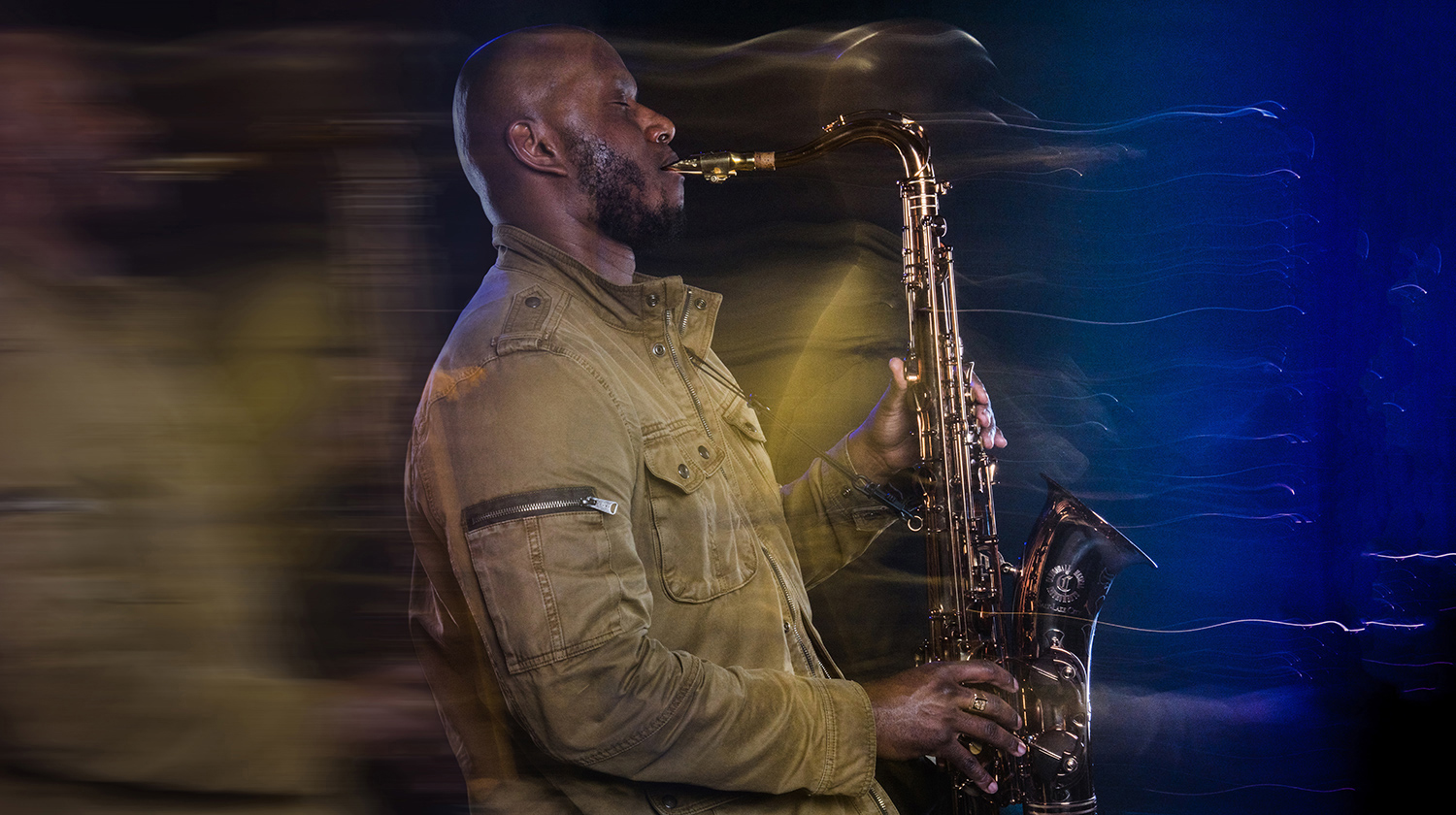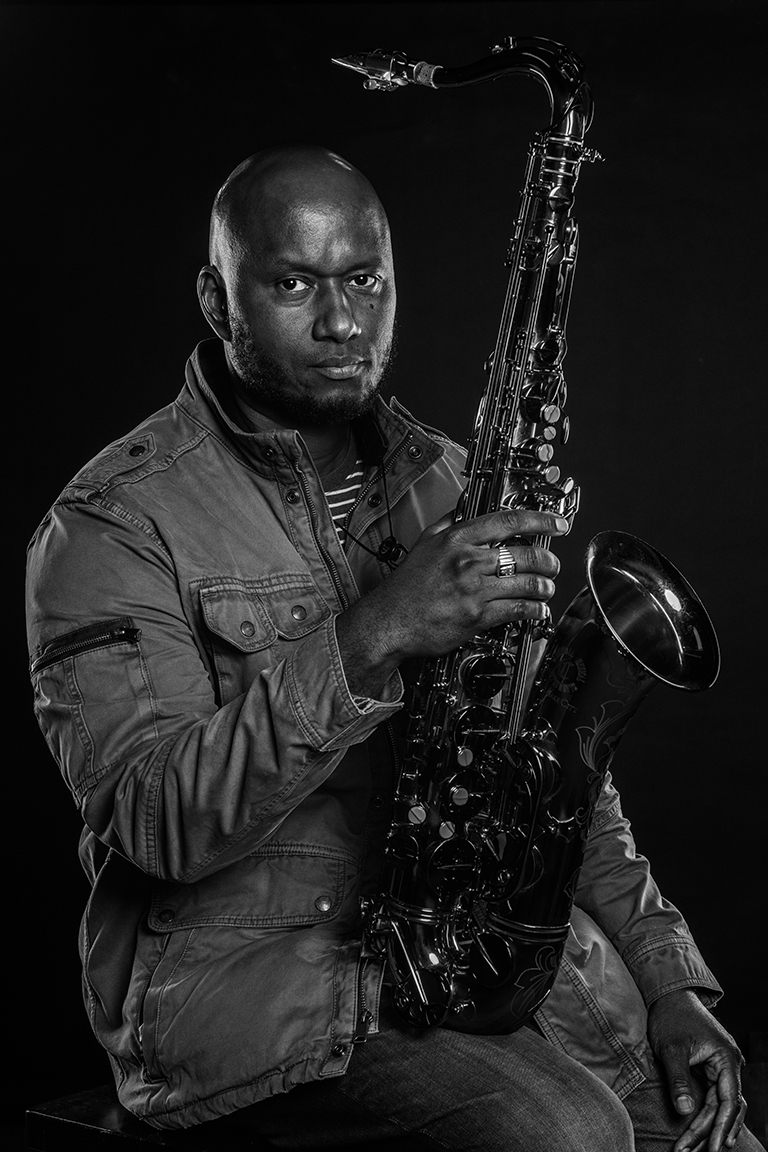
As a seasoned jazz saxophonist, Teodross Avery gives his students a lot to aspire to, and a life filled with rich experiences to learn from.
When Avery joined the faculty at California State University, Dominguez Hills in the fall of 2017 as an assistant professor of Jazz Studies and Commercial Music, he brought with him an “outstanding pedigree” and an abundance of abilities on the saxophone that have been in demand in the music industry since he was 19 years old. It was at that age–when he was still an undergraduate student at the prestigious Berklee College of Music in Boston–that A&R executive Carl Griffin of GRP/Impulse Records signed the young artist to his first recording contract.
That break launched Avery’s professional career. He soon began performing and collaborating with such internationally celebrated performers as Aretha Franklin, Betty Carter, and Ramsey Lewis. Still in college, he released his first album, “In Other Words,” in 1994, which received “five stars” from USA Today. Avery launched his second album, “My Generation,” under the same label in 1996. He would go on to produce a total of six albums–most recently “Post Modern Trap Music” in 2017–and is currently working on his seventh album.

During that time, Avery was also attracting the attention of contemporary mainstream artists. He joined Lauryn Hill as a member of her sold-out world tour from 1998 to 1999. The following year he toured with the platinum record-selling group Matchbox Twenty. He also wrote music for Amy Winehouse’s debut album, “Frank” (Island Records), which went gold in 2004, and collaborated with numerous award-winning artists as a session saxophonist.
As a composer and producer, Avery has performed in a variety of feature films, including “Beauty Shop,” “Brown Sugar,” and “Love Jones.” He has also amassed a number of impressive television credits, such as performances on “American Idol,” “The Ellen Degeneres Show,” the “CBS Morning Show” with Shakira, “The Essence Awards,” “Soul Train Awards,” and “Saturday Night Live.”
Already a seasoned jazz musician, Avery went back to college and earned a Doctorate in Jazz Studies from the University of Southern California in 2016, and he holds a Master in Music from the Steinhardt School of Education at New York University (2006).
Avery shared a few stories about his storied music career, the impact of his parents on his life, his teaching style, and more with CSUDH Campus News Center.
Q: How did you become so successful at such a young age?
A: All I did–pretty much–was just play music. At Berklee, I had a girlfriend, so all I did there was go to school, practice, listen to music, and spend time with her. Since I was away from my family, I dug deeper into those areas. If I would have stayed around home, I don’t think I would have studied as hard as I did. I was also around musicians all the time, and we were all serious. When I was in high school I was around Jazz masters such as Branford Marsalis, Donald Byrd, Elvin Jones, and Freddie Hubbard. Jazz is very mature, serious, and intellectual music. It helped me fly straight in terms of my personality, and my attitude toward music, because they all cared. They had intelligence and dignity about the music, and if you are going to be around that, you have to come up to that level.
Q: Was it intimidating to be around such talent back then?
A: I wasn’t really scared of anything when I was young, even to a fault. There is a hazing aspect to jazz, particularly with some of the older musicians, but you just have to straighten up and really get into their world. That matured and advanced me pretty quickly. So my mentors–since the time I was in high school–were usually in their 50s and 60s, and they had known performers like John Coltrane and Miles Davis. So early on I was learning and receiving information from people who are the real deal.
Q: What was it like in New York City–being mentored by some of the best and soaking up the jazz culture?
A: In the beginning, you are just out there playing as much as possible. I would often play until the sun came up at different clubs in the West Village, like Smalls and the Iridium. We were playing all the time, having jam sessions at our houses, and I had my own group called the Teodross Avery Quartet when I first got there. We did a lot of gigs. I just wanted to get a lot of experience, and play all kinds of music.
Check out Teodross Avery’s music, sign up for a Skype lesson, and more at teodrossavery.com.
Q: So it wasn’t all about jazz for you in New York?
A: There is this unwritten thing, or pressure, that if you play jazz, you only play jazz. But by then I had played many styles of music, and I didn’t want to be limited. I wanted to play hip-hop, funk, rock–to do all of that. I felt I needed to step away from my record label because they had their own definition of what I needed to be for them. So I did, and because of that mindset, I started getting a lot of opportunities. I ended up working with artists like Lauren Hill, Matchbox Twenty, Roy Ayers, Amy Winehouse, Joss Stone, and the Wu-Tang Clan. Sometimes I’d be playing with them on stage, sometimes in the recording studio.
Q: What is it like playing with a mainstream, international artist, such as Amy Winehouse?
A: I worked directly with Amy Winehouse on her album, ‘Frank.’ I really had good experiences with all the mainstream artists I worked with. They all have something different to offer that is really outstanding, but you can never assume that one artist will be more or less talented than another. Some are extremely adept at lyrical writing, others might excel in producing, or writing songs, playing chords– stuff like that. Then there are rappers, or MCs, who are just phenomenal poets and wordsmiths. They all excel in some or several ways. That’s why we all know who they are.
Q: Now you have a Ph.D. and are an assistant professor here at Cal State Dominguez Hills. I read that your parents introduced you to music at a very young age. What effect did they have on your education?
A: My dad was always on me to make sure I studied and was learning, starting at the age of 6. He was a disciplinarian–a military man who served in the Air Force. He made it clear that I had to do things a certain way to be successful, and that wasn’t by taking shortcuts. He didn’t allow me to short anything, particularly in terms of homework. If it didn’t look right, he made me do it over. My mother, she was the one who was always setting high goals for me. When I was doing well in New York and touring, she would still say, “Go get your master’s degree.” And after I did that, she pushed me to get a doctorate.
Q: Can being an active jazz musician and a successful full-time educator go hand-in-hand?
A: Yes it can. I have always wanted to be an evenly yoked artist and educator. I wanted to be someone who could perform with the best of them, as well as be respected as an educator, as an academic, and as an intellectual. From the time when I first picked up my instrument, I looked up to educator and jazz musician Donald Byrd. He had a Ph.D., and yet played with the likes of John Coltrane and Art Blakey, and had his own group called Donald Byrd and the Blackbyrds. He taught at Juilliard and at Howard University–was just a real renaissance man. Being an educator is important to me. This is my first time teaching exclusively in higher education, but I did teach once for about three years at UC Berkeley through an extension program for gifted high school students. Many of my students went on to such institutions as Columbia University, Juilliard, and the New England Conservatory through that program.
Q: What is your impression of our music students at CSUDH so far?
A: They are very eager to learn. I have three different ensembles that I teach, one of them is advanced, while the other two need more of my guidance, but they are all very serious students who are extremely open, and those are the main ingredients to learning and success as an artist.
Q: What advice do you give your students and other would-be jazz musicians who have found themselves on a similar career path as yours?
A: When you are backing mainstream artists, just sit back and observe. Of course, be part of the music and play what they want, but observe them and you will learn that every artist has something to offer you, even those who you are not into that much, because there is going to be something that they do that will give you a hint to what you should or shouldn’t be doing in their music. That in itself is an education, one that can help you navigate your career in a sensible way.